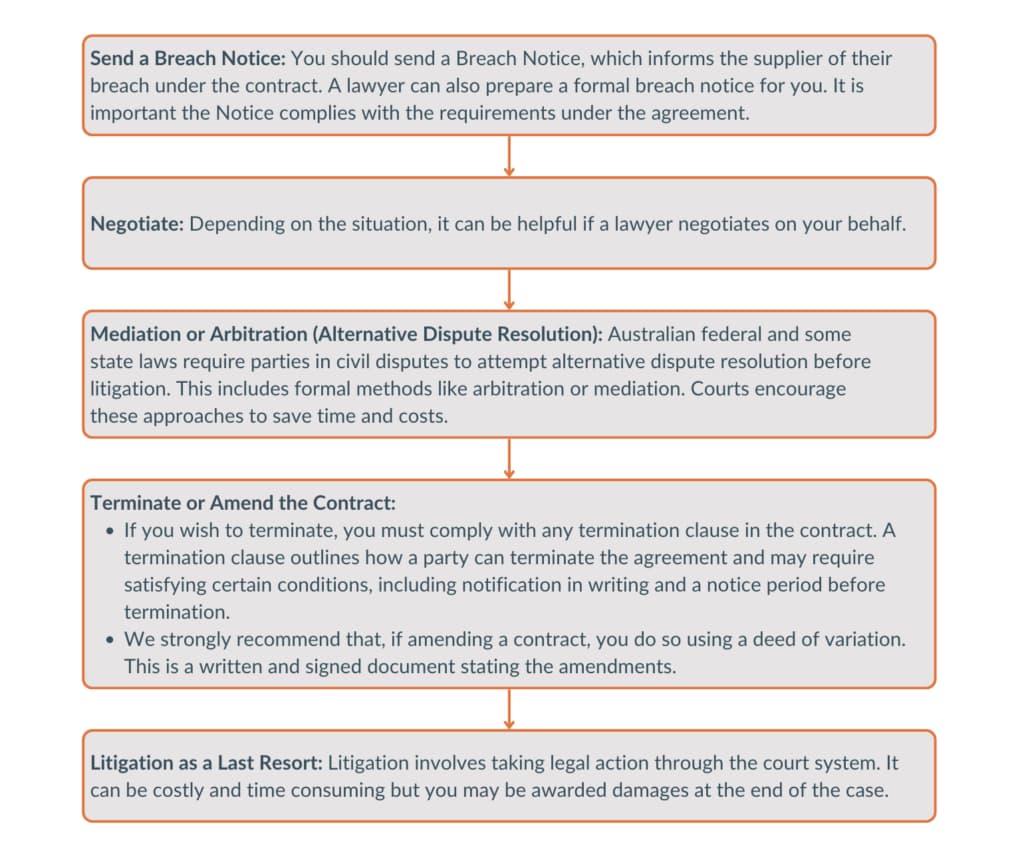On this page
As a food business owner or vendor, you should have food and beverage supply agreements with your suppliers. These agreements set out the specifics of the products required, delivery schedules and logistics, quality specifications and other key considerations for the food and beverage goods. They form the backbone of your business’s daily operations and contribute significantly to its success. When a supplier breaches such an agreement, it can severely disrupt your ordinary operations and pose significant challenges. While frustrating to deal with, there are ways to deal with a supplier breach in the food service industry. This article will guide you through the legal steps to take when faced with a food or beverage supplier breaching a contract with you.
Understanding Contract Breaches
Generally, a breach by a supplier will leave you out of pocket. They can take various forms, including:
- Late Deliveries: This is mainly an issue for perishable food and beverage goods, potentially leading to food waste and disappointed customers.
- Quality Issues: This includes contamination or products that do not meet agreed specifications, risking food safety and customer satisfaction. This can even put your business at risk of regulatory action if your supplier violates food safety regulations.
- Quantity Discrepancies: Receiving fewer goods than ordered can leave you short-stocked and unable to meet customer demand.
- Pricing Disputes: Unexpected price increases or billing errors can impact your profit margins.
Has My Supplier Breached Our Contract?
A breach of contract occurs when a party bound by an agreement fails to perform their obligations under the terms of that contract without a valid legal excuse.
Generally, a breach of contract can be either a:
- Minor Breach: A small failure to perform some agreed-upon term in a contract. Usually, a minor breach would not affect the contract’s essential terms and just means that the supplier failed to meet some more minor obligations.
- Major or Material Breach: This is also referred to as a ‘fundamental’ breach and occurs when a party breaks the key elements of the contract.
Review Your Contract
It is important to understand your rights and obligations to determine if a supplier has breached their food and beverage supply agreement with you. You should identify the:
- Essential Terms: These are the core obligations under the contract. Without them, the contract would lose its essential character or commercial purpose. An example of an essential term in a supply agreement is the supplier’s obligation to provide goods.
- Relevant Clauses: For example, there are breach, termination, and dispute resolution clauses that you should look to. You should also consider any notice requirements to claim a breach.

Reviewing contracts across your business? Download this free checklist to ensure clear terms, fair risk allocation and stronger commercial outcomes
What if I Have No Written Contract With My Supplier?
The situation becomes more complex if there is no formal written contract with a supplier. This does not necessarily mean you will be left without recourse. However, you may turn to the options outlined below.
Implied Contracts
Even without a written agreement, an implied contract may exist based on your course of dealings with the supplier. Factors such as regular orders, consistent pricing and established practices can form the basis of an implied contract. Make sure you search for and save any correspondence with the supplier confirming these details.
Australian Consumer Law (ACL)
The ACL provides certain protections to small businesses that apply regardless of a formal contract. These guarantees only apply if your business could be considered a “consumer”, which would be the case if your business buys goods or services that are:
- under $100,000;
- over $100,000 and normally bought for personal, domestic or household use or consumption; or
- vehicles and trailers used mainly to transport goods on public roads.
Common Law Principles
General case law, known as common law principles, may still apply, such as those relating to negligence or misrepresentation.
What Should I Do When a Breach Occurs?
When you think a breach has occurred, it is crucial to keep proper records and have clear communication with relevant stakeholders. Below are some steps you can take to put yourself in the best position when faced with a breach:
- Document Everything: Take photos, note the dates of events and write detailed descriptions of the issue. You should write down:
- who was involved;
- what happened;
- what was said at what time; and
- where it occurred.
- Gather Relevant Paperwork: Regularly collect invoices, delivery notes and any other pertinent documents.
- Notify Internal Stakeholders: Ensure all relevant team members are aware of the situation.
- Contact the Supplier and Communicate Openly: Sometimes, the breach may result from a period of short-term difficulty for the supplier, which they can overcome with no issues.
Mitigating Damages
While you wait for the supplier to rectify the situation or to respond to your notice, you can take steps to reduce your losses by:
- sourcing from alternative suppliers on a short-term basis;
- adjusting menu items or services if necessary; and
- communicating transparently with customers.
Resolving the Issue Without Legal Intervention
As outlined above, you should informally negotiate with your supplier before seeking legal advice and intervention. If the business relationship with your supplier is important to you, it is recommended that you professionally approach them. You may wish to set up a meeting or call with them to discuss the issues that led to their breach. Sometimes, the matter can be resolved by negotiating different terms and agreeing on a desired outcome.
If this occurs, you should document the agreed items in writing after the discussion.
Formal Legal Steps
If a supplier breaches their contract with you, we recommend seeking legal advice to determine your options. A lawyer can also help you to with the following steps.

Remedies
Depending on what kind of breach has occurred, you may be entitled to certain remedies, such as:
- a right to terminate the contract;
- damages for losses incurred by you;
- specific performance (requiring the other party to perform their obligations under the contract; or
- an injunction to stop the other party from performing a certain action, which may be less applicable if a supplier has failed to supply goods.
Key Takeaways
Breaches of contract in the food service industry can disrupt operations and create financial strain for business owners. Common breaches include late deliveries, quality issues and pricing disputes. Understanding whether a breach is minor or material is key to determining your legal options. If no written contract exists, implied agreements or Australian Consumer Law protections may still apply. Business owners should document breaches, communicate openly with suppliers and attempt resolution before seeking legal intervention. Remedies may include contract termination, damages or specific performance. Legal advice can help navigate these complexities and protect business interests.
If your supplier has breached a contract, our experienced contract lawyers can assist as part of our LegalVision membership. For a low monthly fee, you will have unlimited access to lawyers to answer your questions and draft and review your documents. Call us today on 1300 544 755 or visit our membership page.
Frequently Asked Questions
If your supplier provides contaminated goods or fails to meet quality specifications, start by reviewing your contract to check for relevant clauses on quality requirements and breach terms. Document the issue with photos and written records, then contact the supplier to discuss the problem and request a resolution. If informal negotiation fails, you may have legal remedies, such as claiming damages or terminating the contract. If no written contract exists, protections under ACL or common law principles may still apply.
Yes, you may still have options. An implied contract could exist if you have a history of regular dealings with the supplier, such as consistent orders and pricing agreements. Australian Consumer Law may also provide protections if your business qualifies as a consumer. Additionally, common law principles like negligence or misrepresentation could support a claim. To strengthen your position, gather all relevant communications, invoices and delivery records before seeking legal advice.
We appreciate your feedback – your submission has been successfully received.











